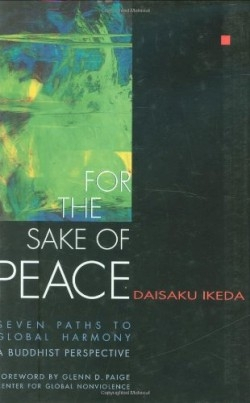
For the Sake of Peace
Seven Paths to Global Harmony A Buddhist Perspective
When John Lennon was gunned down outside the Dakota twenty years ago, it seemed the peace movement was silenced with the gunshots. In the intervening decades, however, Ikeda and the Soka Gakkai International have been articulate spokespeople for peace throughout the world. For the Sake of Peace is a passionate, intelligent plea for mindfulness in both individual and societal action.
The author begins by quoting the preamble of the UNESCO constitution: “Since wars begin in the minds of men, it is in the minds of men that the defenses of peace must be constructed.” Approaching the subject of violence, war, and peace from a Buddhist perspective, Ikeda argues that peace can be achieved through mindful attention to language and thought. He claims war derives from a collapse of intentional dialog and the individual’s bondage “in the narrow confines of the sovereign state.” Reiterating the need for personal awareness and spiritual commitment, Ikeda urges the reader to return to fundamental ethics expressed by classical—Western and Eastern—philosophies, and by so doing “pursue the ideal of cultural pluralism” in order to engender meaningful discussion.
Ikeda, a follower of the Buddhist master Nichiren and a disciple of Japanese pacifist Josei Toda, elucidates Western philosophical thought, from Plato to C. G. Jung while explicating fundamental Buddhist theories of attachment, satori, and the expression of Buddha consciousness. Quoting such literary, philosophical, and political luminaries as T.S. Eliot, Gandhi, Goethe, Emerson, Alexis de Tocqueville, Ortega y Gasset, Walter Lippman, Montaigne, Edward Said, and many more, Ikeda bridges the conceptual gulf between the Judeo-Christian West and the Hindu-Buddhist East. The author is, if nothing else, a scholarly intellect who brings years of thinking to the subject of peace.
Outlining seven paths to peace, Ikeda resorts to emotional appeals more often than providing detailed analyses of how to achieve change. He makes statements such as, “Instead of engaging in cutthroat competition, we should strive to create value.” Polemical statements like this tend to diminish the overall effect of his articulate argument. Ikeda’s earnest commitment to humanity, however, can be sensed when he says “the real seeds of peace lie not in lofty ideas but in human understanding and the empathy of ordinary people.” Such commitment is rare today, and this book lays an articulate foundation for, as Vaclav Havel says, “the resuscitation of fundamental ethics.” If all practiced the principles of empathy, dialog, and awareness that Ikeda outlines, the world would experience a true peace.
Reviewed by
Duncan Sprattmoran
Disclosure: This article is not an endorsement, but a review. The publisher of this book provided free copies of the book to have their book reviewed by a professional reviewer. No fee was paid by the publisher for this review. Foreword Reviews only recommends books that we love. Foreword Magazine, Inc. is disclosing this in accordance with the Federal Trade Commission’s 16 CFR, Part 255.
